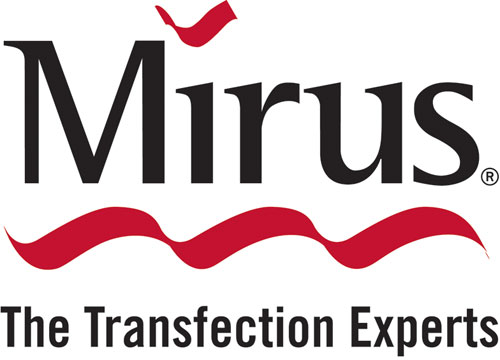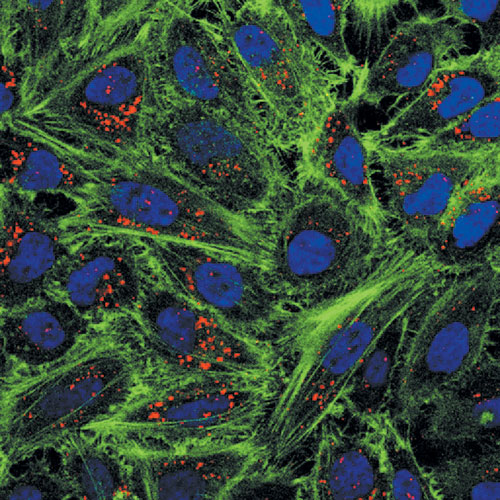October 1, 2011 (Vol. 31, No. 17)
One focus. Transfection.
In scientific terms, transfection represents a type of macromolecule delivery in which large, negatively charged polymers (DNA, RNA) are delivered through cellular membranes and into the intracellular compartments where they can function. Sixteen years after its founding, transfection continues to be the focal point and passion of Mirus Bio’s employees and founders.
Every transfection product offered by Mirus Bio is the result of scientific discovery and development from an in-house team of organic chemists, molecular biologists, cell biologists, and biochemists. When you contact Mirus Bio, you are speaking with a scientist with true expertise in the development, manufacture, and performance of the product.

About the Company
Mirus Bio was founded in 1995 by three University of Wisconsin scientists, Drs. Jon A. Wolff, Vladimir Budker, and James E. Hagstrom, all established leaders in the field of gene delivery. The company started with two ambitious goals: first, to develop and manufacture the most efficient in vitro transfection reagents available; and second, to develop the first nonviral, self-assembling complexes (“artificial viruses”) to be used to deliver genes and RNAs in vivo for therapeutic applications.
In 1995, Mirus Bio scientists developed the formulation that led to the products known as TransIT®-LT1 and FuGENE® 6 Transfection Reagents (Mirus Bio extended a license to Roche to sell FuGENE 6). TransIT-LT1 was the first lipopolyplex transfection reagent to provide both high efficiency and low toxicity (LT) DNA delivery to cells. This has proven to be the transfection formulation of choice for a generation of scientists.
In 2006 Mirus Bio scientists developed the first polymer-based, self-assembling nanoparticles, also known as DPCs—Dynamic PolyConjugates™, which facilitate highly efficient suppression of gene expression in mammals. This breakthrough technology represents the future of therapeutic RNA interference and led to the purchase of Mirus’ Therapeutic division by Roche Pharmaceuticals in 2008. The Products division of Mirus remains a privately held company, Mirus Bio.
Our initial goals continue to shape the direction of the company. Mirus Bio remains focused on the development and sale of novel in vitro transfection products for use by researchers worldwide. Most recent research efforts have led to the development of TransIT-2020, TransIT-PRO® and Ingenio®, which represent the most advanced products to date for broad-spectrum DNA transfection, protein production, and electroporation, respectively.

Markets Served
Mirus Bio serves the global research market through an expansive and innovative product offering. Our broad-spectrum transfection reagents effectively deliver nucleic acid into the vast majority of cell types while specialized reagents are optimized for individual cell types. These reagents are utilized by academic, biotechnology, and pharmaceutical researchers to better understand the mechanisms that underlie mammalian biology.
Mirus Bio complements its DNA delivery reagents with RNA transfection reagents. TransIT-TKO® and TransIT-siQUEST® siRNA Transfection Reagents are routinely used for gene silencing in high-throughput RNAi screening experiments, while the TransIT-mRNA Transfection Kit has most recently been exploited in the generation of induced pluripotent stem cells.
Additionally, the Ingenio Electroporation Kits provide an alternative to chemical transfection approaches. This broad-spectrum solution is compatible with all common electroporation instruments and is an effective method to address cell types that are resistant to traditional gene delivery methods.
Capabilities
Mirus Bio specializes in the science and art of nucleic acid delivery. Using nature’s own elegant nucleic acid delivery vehicles (viruses) as their model system, Mirus Bio scientists continue to develop state-of-the-art, nonviral, self-assembling complexes (transfection complexes) that serve as DNA or RNA carriers.
These complexes are created via a simple mixing of nucleic acid (DNA or RNA) with the appropriate transfection formulation providing highly efficient and reproducible delivery into a wide variety of cells. The delivery mechanism mimics virus delivery in several key ways including active transport into the cell (endocytosis) and endosomal destabilization and release.
Mirus Bio offers state-of-the-art transfection products for a comprehensive range of cell types and research applications. All products are developed and manufactured in the Mirus laboratories located in Madison, Wisconsin.
Mirus Bio
545 Science Drive
Madison, WI 53711
Phone 608.441.2852 888.530.0801
Website www.mirusbio.com
www.thetransfectionexperts.com
Date Founded 1995
Number of Employees < 50



